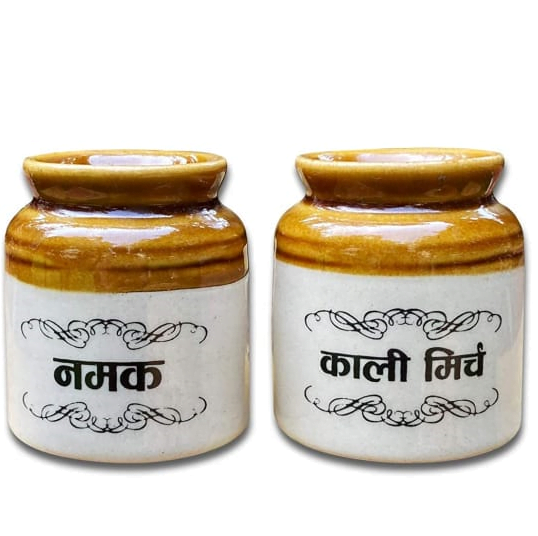In a small town one morning, a sadhu came looking around at the shops on both sides of a small street leading towards the main market. He was thirsty and looking to get some water to drink. The shop owners were just opening their shops and getting settled to start a new day of their business. He saw a grocery shop which had opened early and the owner, a noble looking old man, was sitting peacefully and reading the newspaper.
Sadhu went up to him and requested if he could get some water to drink. The owner looked up from the newspaper, saw this old sadhu perspiring, he welcomed him into his shop and offered a seat next to him. He asked his boy to get a jug of water.
Sadhu wiped his face with the cloth on his shoulder and felt good for this brief rest after a long walk from a distant village. He looked around in the grocer’s shop and saw ceramic bottles and tin boxes on the shelves. In order to strike a conversation, he asked the owner, “All these bottles and tin boxes seem to be filled with different spices….huh…what is in that bottle?” The old man said, “that has Namak (salt)” “and in the next?” Asked the Sadhu. “black pepper” “Turmeric, Red Chilli …” Sadhu kept asking and the owner very patiently kept responding….The sadhu looked at a tin box at the end of the shelf and asked…what is in that box?
The old man replied, “in that box is Shree Krishna.”
“Shree Krishna? The Sadhu was surprised. I have never heard of any spice named as Krishna.” Sadhu wondered.
The shop owner smiled and said, “The box is actually empty. But I don’t like to call it empty and hence I say There is Shree Krishna in it.”
The old Sadhu was dumbstruck. He got a shock listening to this simple and obvious-sounding reply. The box is actually EMPTY…hence there is Shree Krishna in it.” Tears started rolling down from Sadhu’s eyes. He touched the shop owner’s feet and said, I have been looking for God all my life. Never realized that one should be empty oneself from Ego, jealousy, anger, greed…and only then Krishna can enter. Today you taught me my life lesson.”
As he left he greeted the shop owner with folded arms, “Jai Shree Krishna.”
— — — — — — — — — — — — — — — — — — — — — — — — — — — — — —
“A German scholar came to Ramana Maharshi and said, “I have come from very far away to learn something from you.”
Ramana laughed and said, “Then you have come to the wrong place. Go to some university, some scholar, some great pundit; there you will be able to learn. If you come to me then be aware that learning is not possible here, we teach only unlearning. I can teach you how to unlearn, how to throw words away, to create space within you. And that space is divine, that space is God.”
Where are you seeking? In words, in scriptures? Then one day or other you will become an atheist. A pundit, a scholar, cannot remain a theist for long. Remember, howsoever he knows, whatsoever he knows about The Bible and the Gita and the Koran, a scholar is bound to become an atheist one day because that is the logical consequence of gathering words. Sooner or later he will ask: Where is God? No Bible can reply, no Gita can supply the answer. Rather, Bibles and Gitas and Korans, when they are too much on your mind, will make you miss the divine because the whole of your mind space is filled…there is too much furniture in you. God cannot move. God may not be able to make any contact with you if the mind is too wordy. Then it is impossible to listen, and if you cannot listen, how can you pray? It is impossible to wait, words are too impatient, they are knocking from within to get out.
When you are aggressive through words going out, nothing can penetrate you, neither love, nor meditation, nor God. And all that is beautiful happens as an ingoing process.
When you are silent, no words knocking within to get out, when you are waiting — in that moment of waiting beauty happens, love happens, prayer happens, God happens. But if a man is too addicted to words, he will miss it all. In the end he will have a long collection of words and theories, logic, everything — but nothing is worthwhile because the content is missing.
You have the net, the trap, but no fish are there. If you had really caught the fish you would have thrown away the net immediately. Who bothers? If you have really used the ladder, you forget it. Who thinks about it? You have transcended it, it has been used.
So whenever a man really comes to know, knowledge is forgotten. That is what we call wisdom. A wise man is one who has been able to unlearn the knowledge. He simply drops all that is nonessential.”
Osho: The Empty Boat Chapter #9 Chapter title: Means and Ends
— — — — — — — — — — — — — — — — — — — — — — — — — — — — —
“Man is a confusion, confusion between the body and the soul, confusion between the material and the spiritual, confusion between logic and love. Out of this confusion there is no possibility of knowing God. Out of this confusion you can go on crying and praying, but your prayer will never reach to the divine, your crying is futile. Out of this confusion you will not be able to see the light. This confusion has to be dropped.
One has to become intensely aware or intensely loving. These are the only two keys which can bring man out of the state he is in: either intense awareness — that is the path of meditation — or intense, total love — that is the path of devotion.
Kabir is a devotee: he is on the path of love. He will talk of love again and again, but what he means by love has to be understood well. By love he means an intense desire to disappear into the whole.
It is not the love you know of, that you talk about; it is a totally different phenomenon. Your love is an effort to dominate the other; it is a strategy to possess the other, to exploit the other. Kabir is not talking about that love. You cannot possess God, you can only be possessed by God.
To love God means to surrender, to trust, to be ready to die into Him, because dying in God is the beginning of a new life; it is resurrection. Love has to become such an intense flame that it bums you out, that you are not left behind, that you are consumed in it. If you are not, the Guest comes.
This paradox has to be understood: the Guest cannot come if the host is very much there; the Guest can come only when the host is not there at all. In fact, that’s what it really means to be a host: absent, utterly absent, with no ego, with no idea of ’I’ within you; just an utter, pure emptiness, then you are a host. When the host is not there, then you are really a host. And then not even a split second is lost and the Guest comes.
The Guest does not come from the outside, hence there is no time gap. The dying of the host is the resurrection of the Guest. You are the host, you are the Guest! If you live with the I you remain a host, unacquainted with the Guest. If you drop the I, you are the Guest.”
Osho: The Guest: CHAPTER 4. THE GUEST WAITS FOR YOU TO DIE:
Kabir says –
प्रेम गली अति संकरी, तामें दाऊ न समाई |
जब मैं था तब हरी नहीं, अब हरी है मैं नाहीं ||
Prem gali ati sankari, tamein dou na samai
Jab mein tha tab hari nahi, ab hari hai mein naahi.
The street of love is very narrow, two can’t pass through at the same time
When I was there, there was no God(hari), now there is God but I am not
MEANING — To attain true love, one has to give up his ego. When the ego disappears, God appears. So the devotee must give up his ego to realize God.

